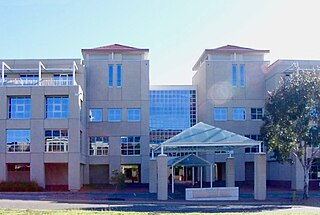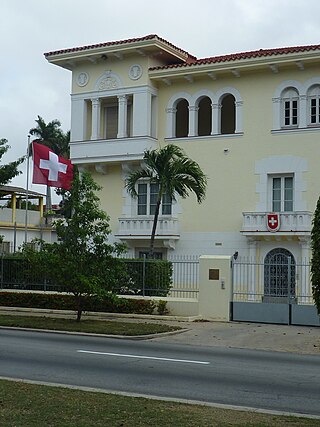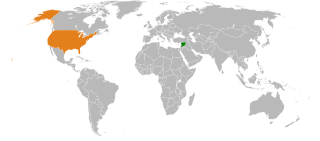
The Foreign relations of Egypt are the Egyptian government's external relations with the outside world. Egypt's foreign policy operates along a non-aligned level. Factors such as population size, historical events, military strength, diplomatic expertise and a strategic geographical position give Egypt extensive political influence in the Middle East, Africa, and within the Non-Aligned Movement as a whole. Cairo has been a crossroads of the Arab world's commerce and culture for centuries, and its intellectual and religious institutions are at the center of the region's social and cultural landmarks.
The foreign relations of Ireland are substantially influenced by its membership of the European Union, although bilateral relations with the United States and United Kingdom are also important to the state. It is one of the group of smaller nations in the EU and has traditionally followed a non-aligned foreign policy. Ireland has historically tended towards independence in foreign military policy, thus it is not a member of the North Atlantic Treaty Organisation and has a longstanding policy of military neutrality. According to the Irish Defence Forces, the neutrality policy has helped them to be successful in their contributions to United Nations peace-keeping missions since 1960 and subsequently in Cyprus, Lebanon and Bosnia and Herzegovina.

Foreign relations of Qatar is conducted through its Ministry of Foreign Affairs. Arab states were among the first to recognize Qatar, and the country gained admittance to the United Nations and the Arab League after achieving independence in 1971. The country was an early member of OPEC and a founding member of the Gulf Cooperation Council (GCC). Diplomatic missions to Qatar are based in its capital, Doha.

Ensuring national security, increasing influence among its Arab neighbours and securing the return of the Golan Heights, have been the primary goals of the Syrian Arab Republic's foreign policy. At many points in its history, Syria has seen tension with its neighbours, such as Turkey, Israel, Jordan, Iraq, and Lebanon. Syria enjoyed an improvement in relations with several of the states in its region in the 21st century, prior to the Arab Spring and the Syrian Civil War.

Foreign relations of Australia are influenced by its position as a leading trading nation and as a significant donor of humanitarian aid. Australia's foreign policy is guided by a commitment to multilateralism and regionalism, as well as to build strong bilateral relations with its allies. Key concerns include free trade, terrorism, refugees, economic co-operation with Asia and stability in the Indo-Pacific. Australia is active in the United Nations and the Commonwealth of Nations. Given its history of starting and supporting important regional and global initiatives, it has been described as a regional middle power par excellence.

A protecting power is a country that represents another sovereign state in a country where it lacks its own diplomatic representation. It is common for protecting powers to be appointed when two countries break off diplomatic relations with each other. The protecting power is responsible for looking after the protected power's diplomatic property and citizens in the hosting state. If diplomatic relations were broken by the outbreak of war, the protecting power will also inquire into the welfare of prisoners of war and look after the interests of civilians in enemy-occupied territory.

Diplomatic relations between Syria and the United States are currently non-existent; they were suspended in 2012 after the onset of the Syrian Civil War. Priority issues between the two states include the Arab–Israeli conflict, the Golan Heights annexation, Iraq War, alleged state-sponsorship of terrorism, occupation of Lebanon, etc.

Diplomatic relations between Australia and Ukraine were established in 1992. Ukraine has had an embassy in Canberra since March 2003 and the Australian Embassy in Kyiv was established in December 2014, however, Australia closed its embassy in Kyiv in February 2022 due to the 2022 Russian invasion of Ukraine.

The Embassy of Australia in Moscow is the diplomatic mission of Australia to the Russian Federation. The current head of post and Ambassador of Australia to the Russian Federation is Graeme Meehan. The embassy serves as the diplomatic mission for Australia to the Russian Federation, Armenia, Belarus, Kazakhstan, Kyrgyzstan, Tajikistan, Turkmenistan and Uzbekistan. The chancery is located at 10A/2 Podkolokolny Lane in the Tagansky District of Moscow.

The Ministry of Foreign Affairs of the Republic of Belarus is the Belarusian government ministry which oversees the foreign relations of Belarus.

Australia and Uruguay have had consular relations since 1923 and diplomatic relations since 1948. Australia is represented in Uruguay through its embassy in Buenos Aires (Argentina) and an honorary consulate in Montevideo. Uruguay has an embassy in Canberra a consulate general in Sydney and honorary consulates in all State capitals.

The 1955 Austrian State Treaty ended the four-power occupation and recognized Austria as an independent and sovereign state. In October 1955, the Federal Assembly passed a constitutional law in which "Austria declares of her own free will her perpetual neutrality." The second section of this law stated that "in all future times Austria will not join any military alliances and will not permit the establishment of any foreign military bases on her territory." Since then, Austria has shaped its foreign policy on the basis of neutrality.

Syria–United Arab Emirates relations refer to the relationship between the United Arab Emirates (UAE) and the Syrian Arab Republic. The UAE has an embassy in Damascus and Syria has an embassy in Abu Dhabi and a consulate-general in Dubai. Both countries are members of the Arab League, part of the Middle East region and share close cultural ties.
International reactions to the Syrian civil war ranged from support for the government to calls for the government to dissolve. The Arab League, United Nations and Western governments in 2011 quickly condemned the Syrian government's response to the protests which later evolved into the Syrian civil war as overly heavy-handed and violent. Many Middle Eastern governments initially expressed support for the government and its "security measures", but as the death toll mounted, especially in Hama, they switched to a more balanced approach, criticizing violence from both government and protesters. Russia and China vetoed two attempts at United Nations Security Council sanctions against the Syrian government.

Australia–North Korea relations refers to the existing bilateral relationship between Australia and North Korea. Relations were officially established on 31 July 1974 when Australia extended diplomatic recognition to North Korea under the Whitlam government. Overall, relations have been stressed and at times, tense, due to Australia's historical involvement in the Korean War and military alliance with the United States, and contemporary disputes such as North Korea's nuclear weapons program and accusations of human rights abuses by both sides.

Spain–Syria relations are the bilateral and diplomatic relations between these two countries. Syria has an embassy in Madrid. Spain has an embassy in Damascus. Both countries are charter members of the Union for the Mediterranean, although Syria suspended its membership in 2011.

Mexico–Syria relations are the diplomatic relations between the United Mexican States and the Syrian Arab Republic. Both nations are founding members of the United Nations.
















